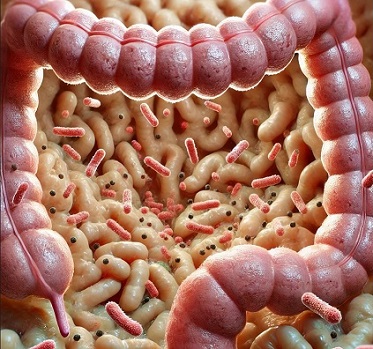The Probiotic Lacticaseibacillus Casei IB1 Can Help Combat Inflammatory Bowel Disease
Nikhil Prasad Fact checked by:Thailand Medical News Team Jul 09, 2024 9 months, 2 weeks, 3 days, 17 hours, 28 minutes ago
Gastroenterology Updates: A New Hope for IBD Sufferers
Inflammatory Bowel Disease (IBD) is a chronic condition that affects millions worldwide, causing severe gastrointestinal distress. Researchers from Guangdong Ocean University-China and the Shenzheng Institute of Guangdong Ocean University-China have made a significant breakthrough in the fight against IBD. They have discovered that a probiotic strain, Lacticaseibacillus casei IB1, can alleviate the symptoms of IBD by regulating the gut microbiota and restoring the intestinal epithelial barrier. This
Gastroenterology Updates news report delves into the details of this exciting study and its implications for those suffering from IBD.
 The Probiotic Lacticaseibacillus Casei IB1 Can Help Combat Inflammatory Bowel Disease
Image: AI Generated
What is IBD?
The Probiotic Lacticaseibacillus Casei IB1 Can Help Combat Inflammatory Bowel Disease
Image: AI Generated
What is IBD?
IBD, which includes conditions such as ulcerative colitis (UC) and Crohn’s disease (CD), is characterized by chronic inflammation of the gastrointestinal tract. Symptoms often include abdominal pain, diarrhea, weight loss, and bloody stool. Various factors contribute to the development of IBD, including genetics, diet, immune system dysfunction, and an imbalance in gut microbiota. Traditional treatments often involve antibiotics, steroids, and immune inhibitors, which can have significant side effects. Hence, there is a pressing need for safer and more effective treatment options.
The Power of Probiotics
Probiotics are live microorganisms that confer health benefits to the host when consumed in adequate amounts. They are known to produce beneficial enzymes, organic acids, vitamins, and bacteriocins, which can improve the host’s health. Probiotics like Lacticaseibacillus, Bifidobacterium, and Enterococcus have been used to treat various gastrointestinal disorders due to their antibacterial, immune-modulating, and anti-inflammatory properties.
The Study: How Lacticaseibacillus casei IB1 Works
Researchers Jianlong Lao, Shuping Yan, Yanhong Yong, Yin Li, Zhaohai Wen, Xiaoyong Zhang, Xianghong Ju, and Youquan Li conducted a study to explore the effects of Lacticaseibacillus casei IB1 on a mouse model of DSS-induced colitis, a condition similar to human UC. The results were promising:
-Alleviating Colitis Symptoms: Mice treated with L. casei IB1 showed significant improvement in body weight, colon length, and goblet cell numbers. There was also a notable decrease in the Disease Activity Index (DAI), proinflammatory factors (TNF-α, IL-1β, and IL-6), and histopathological scores.
-Improving Gut Barrier Function: L. casei IB1 enhanced the expression of tight junction proteins such as occludin, claudin1, and ZO-1. These proteins are crucial for maintaining the integrity of the intestinal barr
ier, which prevents pathogens from entering the bloodstream.
-Regulating Inflammatory Pathways: The study found that L. casei IB1 inhibited the activation of the MAPK and NF-κB signaling pathways, which are key regulators of the inflammatory response. By suppressing these pathways, the probiotic reduced intestinal inflammation.
-Balancing Gut Microbiota: The probiotic treatment rebalanced the gut microbiota in colitis-affected mice by increasing the abundance of beneficial bacteria like Faecalibaculum and Alistipes and decreasing harmful bacteria like Bacteroides and Escherichia_Shigella.
Detailed Findings
-
Body Weight and Colon Length Improvement
The study observed that mice with DSS-induced colitis experienced significant weight loss and shortened colon lengths. However, mice treated with L. casei IB1 showed marked improvement in both parameters. The MID and HIGH dose groups showed the most significant improvements, highlighting the dose-dependent effect of the probiotic.
-Histopathological Analysis
Histological examinations revealed that DSS-induced colitis caused severe damage to the colon’s epithelial structure, including crypt destruction and inflammatory cell infiltration. In contrast, L. casei IB1 treatment reduced these damages, preserving the epithelial structure and increasing goblet cell numbers, which are essential for maintaining mucosal integrity.
-Serum Cytokine Levels
Inflammatory cytokines such as TNF-α, IL-1β, and IL-6 were significantly elevated in the DSS group, indicating a robust inflammatory response. L. casei IB1 treatment reduced the levels of these proinflammatory cytokines while increasing the anti-inflammatory cytokine IL-10, demonstrating the probiotic’s anti-inflammatory potential.
-Tight Junction Proteins and Intestinal Barrier Function
The integrity of the intestinal barrier was assessed by measuring the expression of tight junction proteins. DSS treatment reduced the levels of occludin, claudin1, and ZO-1, compromising the barrier function. L. casei IB1 treatment restored the expression of these proteins, thereby improving the barrier function.
-Inflammatory Signaling Pathways
The study also investigated the impact of L. casei IB1 on the NF-κB and MAPK signaling pathways. These pathways are crucial for the inflammatory response. DSS treatment activated these pathways, while L. casei IB1 inhibited their activation, reducing inflammation.
-Gut Microbiota Composition
16S rRNA sequencing was used to analyze the gut microbiota composition. DSS treatment disrupted the microbial balance, decreasing beneficial bacteria and increasing harmful ones. L. casei IB1 treatment reversed these changes, increasing the abundance of beneficial bacteria and reducing harmful ones, thereby promoting gut health.
Conclusion: A Promising Future for IBD Treatment
The findings from this study suggest that Lacticaseibacillus casei IB1 has great potential as a therapeutic probiotic for treating IBD. It alleviates colitis symptoms, improves gut barrier function, reduces inflammation, and balances gut microbiota. This probiotic offers a safer and more effective alternative to traditional IBD treatments, with fewer side effects.
The study findings were published in the peer-reviewed journal: Microorganisms.
https://www.mdpi.com/2076-2607/12/7/1379
For the latest
Gastroenterology Updates, keep on logging to Thailand Medical News.
Read Also:
https://www.thailandmedical.news/news/probiotics-show-promise-for-kids-with-irritable-bowel-syndrome
https://www.thailandmedical.news/news/probiotics-for-gut-and-fatigue-relief:-a-study-on-lacticaseibacillus-rhamnosus-strains
